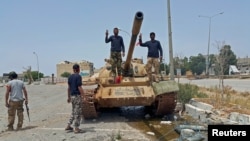On Monday, Libyan Armed Forces Commander Khalifa Haftar repeated calls for weapons and training to help his army fight Islamic State (IS) militants.
“We are not in need of men, but we need weapons,” he said. “If we increase our arms, then more men will be able to fight these oppressive groups that have come to us from everywhere.”
Last week, the Arab League pledged to answer that call by announcing plans to discuss operational steps toward building a regional military force to fight IS.
According to Cairo-based political analyst Hisham Kassem, the move reflects a changing security dynamic throughout the region. The Middle East and parts of Africa are security “consumers," and militaries outside the region are no longer interested in being “providers,” he says, leaving Arab leaders no choice but to step in.
“There is no option now but to create this force, because it’s not simply Libya,” Kassem said. “This is a terror belt that is extending from West Africa all the way up to Afghanistan almost non-stop.”
An Arab League force will be difficult to build, and any victory will be hard-won, he adds, but some countries want to keep their military resources at home to fight local security crises. The Egyptian army, one of the most powerful in the region and built to fight wars with other countries, not insurgencies, is bound to be a leader in the force, he says.
In Jordan, another country expected to lead a regional force, Amman-based political analyst Labib Kamhawi says if initial plans to train and arm Libyans is unsuccessful, states with the most to lose may intervene directly.
But it will be hard to accomplish anything, he cautions, without first ending Libya’s messy civil war.
“If the Libyans insist on fighting each other, this is a serious obstacle,” he said.
The Libyan people may be united against IS, which is seen as a foreign invading force, he says, but the country’s many factions need to stop fighting each other before they can form a military strong enough to crush extremism.
“As long as the danger is coming from forces or organizations from outside Libya, then it is easy to rally the Libyan people’s support.”





